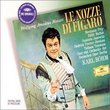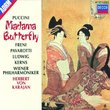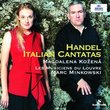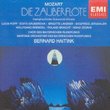The recording well-worth waiting, with exceptional music.
David A. Hollingsworth | Washington, DC USA | 03/11/2001
(5 out of 5 stars)
"As far as I can tell, this is the first recording of wide circulation of Prokofiev's "Love for Three Oranges" (in prologue and five acts) performed exclusively by Russian artists under the Russian tongle. Before this recording, Virgin Classics recorded the complete version of the work by 1989, with Kent Nagano leading the chorus and orchestra of Lyon Opera. That highly successful recording, which is still available, is sung in French, something Prokofiev translated from the original Russian. The opera's success in the former Soviet Russia led me to belief that Melodiya recorded the complete edition of the work (probably more than once), though its chronic distribution troubles left us nothing but wondering.Kabalevsky's "Colas Breugnon" comes to mind when hearing this theatrical masterpiece. Both works are extremely vivid and virtuosic. The spirits are high and the invention is admirable throughout. Kabalevsky's opera (of 1937, in the height of socialist realism) is more formal and traditional (not deplorable at all, please don't get me wrong) while Prokofiev's (of 1920, when the avant garde movement was taking shape) avoided the conventions of an opera, especially in regards to the chorus. The infamous march has its own shape, melodic appeal, and rhythm. However, the themes of the work comes and goes, with no development bestowed upon them at all while dramatically, the plot is unorthodox, affected by the intervention of various groups of spectators (the Comicals, Tragicals, Lyricals, Empty-Heads, and the Eccentrics). If that isn't enough, each of the groups have their own issues and agendas (towards the comic, the tragic, the philosophy, and the fun). Overall, the Kabalevsky is comical, mixed in with some dramatic intensity (especially of Act II, Scene III where people scattered in fright once the bubonic plague hit the city of Clamency, 16th Century). The Prokofiev is satirical, fill with irony and fantasy, all admirably manifested in the Prologue and is something even Carl Nielsen would have greatly admired (his Maskarade is equally inventive, original, and witty).Vsevolod Meyerhold, among the most eminent of directors in Soviet Russia, was the main instigator of the this operatic project. In searching for ways to revitize Russian theatre, Meyerhold grabbed hold of Carlo Gozzi's "L'amore delle tre melarance", a play of satire, surrealism, and full with conflicting fantasies. Apollinaire, the French poet introduced the plays of Gozzi to Meyerhold, including this one, and along with Vogak and Solovev, Meyerhold used this play in introducting ways of expanding the theories of the theatrics beyond the traditions, in a journal entitled "Love for Three Oranges." Four years later, in 1918, Meyerhold, fully aware of Prokofiev's leaning towards experimentation (and ultimately towards the avant garde movement in the 1920s), handed him the first issue of the journal and suggested that he use his own adaptation of Gozzi's play for an opera. It was in Prokofiev's suitcase when he left Russia for Chicago during that same year.Meyerhold was right! Prokofiev was attracted to the amount of scenic and textual freedom the play allows and Cleofonte Campanini, the Director of the Chicago Opera Company, realized the potential of the operatic treatment of the play and commissioned it (the production of the Love for Three Oranges was scheduled for the 1919-1920 season). Originally, the Gambler was to be produced, but the score remained in Petrograd. Campanini died suddenly during the stage preparations of the opera and its production was prosponed until December 31st, 1921, thanks to the Opera Company's newly appointed director, Mary Garden, a huge fan of modern music. A day after the premiere, conducted by Prokofiev himself, the critics torn it apart, but the audience of Chicago admired it warmly and the success of the work as assured in Europe and Russia after 1925. Astonishingly, Paris (arguably the center of the avant garde movement) waited until 1956 to stage the work. Needless to say, the performance altogether is flawless. Valery Gergiev brings out the sparkle and the wit of the score effectively and his rendition is with zest and finese, responded admirably by the Kirov Orchestra and Chorus. The singers were extremely well cast, with the characters portrayed anything other than one-dimensionals. Evgeny Akimov as the Prince is humorous with something of a defiance while even his whining never cease to amuse. Mikhail Kit as the King of Clubs is likewise fresh and strong while Larissa Dyadkova is lyrical and strong, not as tender and vulnerable as Lia Shevtsova in Ninetta. I would hesitate to say that this issue surpassed the Virgin Classic recording of the work, with Kent Nagano every bit as creative and imaginative as Gergiev and with fine-tuned orchestra at his disposal. Having said that though, Gergiev's Prokofiev series is worthy of everlasting cherish and this issue is at a pinnacle of Gergiev's tireless efforts in promoting his operas. I now sense something of a revival of this work in the vein similar to the Fiery Angel and War & Peace."
Great set
G.D. | Norway | 01/26/2009
(5 out of 5 stars)
"This might be the best available recording of Prokofiev's most popular (at least most often performed) opera. I am not sure it is the best of his operas (The Fiery Angel is a strong contender), but the combination of the slightly absurd and sometimes genuinely amusing absurdist plot combined with Prokofiev's masterly handling of the orchestra, makes it a very satisfying work. There are no real arias or set numbers here, yet there are several instantly memorable instrumental parts (not least the famous march); the whole thing is hugely inventive and unconventional, yet immediately appealing and full of atmosphere.
Gergiev, opting for the Russian version, predictably takes a rather fierce view of the work; with lots of - indeed perhaps a little too much - urgency. But he draws some marvelous playing from the Concertgebouw and usually doesn't miss out on the subtle details of the score. The chorus is great - indeed, the chorus is one of the consistent strengths of the Gergiev Russian opera series, and they surely do not disappoint here. The singers are also generally excellent, including the minor roles, and special praise should go to Akimov, who gives an impressively varied characterization as the prince and is able to get the most out of this character with light, effective and humorous singing. Very strongly recommended."
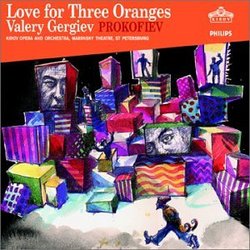

 Track Listings (13) - Disc #1
Track Listings (13) - Disc #1

